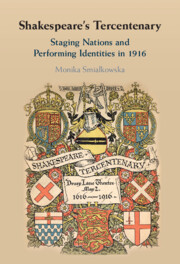Book contents
- Shakespeare’s Tercentenary
- Shakespeare’s Tercentenary
- Copyright page
- Dedication
- Contents
- Figures
- Acknowledgements
- Introduction
- Chapter 1 ‘Unser Shakespeare’? The Tercentenary and Germany
- Chapter 2 ‘Our English Shakespeare’? The Tercentenary and Britain
- Chapter 3 Shakespeare among the Allies
- Chapter 4 ‘Not Primarily Patriotic’? The Tercentenary and American National Identity
- Chapter 5 Voices from the Margins
- Conclusion
- Selected Bibliography
- Index
Chapter 5 - Voices from the Margins
The Tercentenary and American Racial and Ethnic Minorities
Published online by Cambridge University Press: 13 January 2024
- Shakespeare’s Tercentenary
- Shakespeare’s Tercentenary
- Copyright page
- Dedication
- Contents
- Figures
- Acknowledgements
- Introduction
- Chapter 1 ‘Unser Shakespeare’? The Tercentenary and Germany
- Chapter 2 ‘Our English Shakespeare’? The Tercentenary and Britain
- Chapter 3 Shakespeare among the Allies
- Chapter 4 ‘Not Primarily Patriotic’? The Tercentenary and American National Identity
- Chapter 5 Voices from the Margins
- Conclusion
- Selected Bibliography
- Index
Summary
This chapter recovers the voices of marginalised US communities – Native, Jewish, and African Americans – bringing out of oblivion their Tercentenary contributions. It asks whether underprivileged racial and ethnic groups accepted the alleged superiority of the ‘Anglo-Saxon’ cultural heritage, and whether, by appropriating Shakespeare, they attempted to become part of that heritage or to challenge its exclusivity. It demonstrates that 1916 America was torn between competing impulses of assimilation and diversity. The white majority held out ostensibly universal cultural standards to which all should aspire, while believing that they were unattainable to some groups. The minorities faced the irreconcilable demands of trying to conform to these standards at the cost of renouncing their distinct identity, while sensing that white supremacists would never accept them as equal no matter what they did. The Tercentenary celebrations registered these tensions and allowed the members of American minorities to produce hybrid Shakespearean appropriations, which accommodated a far-reaching critique of dominant ideology. They helped them to express their distinctive identities, while highlighting the entrenched inequality that they endured.
Keywords
- Type
- Chapter
- Information
- Shakespeare's TercentenaryStaging Nations and Performing Identities in 1916, pp. 229 - 287Publisher: Cambridge University PressPrint publication year: 2023

